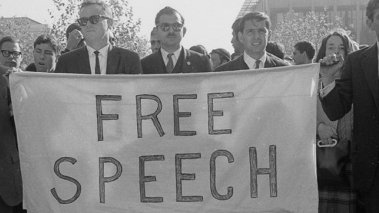Table of Contents
The Free Speech Movement vs. UC Berkeley Chancellor Dirks on Free Speech

FIRE President Greg Lukianoff and Popehat’s Ken White aren’t the only ones criticizing University of California, Berkeley Chancellor Nicholas Dirks for his half-hearted celebration of the 50th anniversary of UC Berkeley’s Free Speech Movement (FSM) last week. Members of the FSM itself are speaking up.
The Berkeley Daily Planet reported yesterday that the Board of Directors of the Free Speech Movement Archives and the 50th Anniversary Organizing Committee have sent a letter to Dirks chastising him for “miss[ing] the central point” of the FSM. The directors of the Free Speech Movement Archives—several of whom faced government retaliation, including arrest, during the movement’s campaigns 50 years ago—write in their letter:
In celebrating the half century that the UC Berkeley campus has been “a symbol and embodiment” of the idea of free speech, you are proudly and properly referring to the outcome produced by the Free Speech Movement in the fall of 1964. Your statement seems to miss the central point. The struggle of the FSM was all about the right to political advocacy on campus.
[...]
It is precisely the right to speech on subjects that are divisive, controversial, and capable of arousing strong feelings that we fought for in 1964. . .
From the roof of the police car blockaded in Sproul Plaza, we heard a song written by a UC graduate (BA, MA, PhD) Malvina Reynolds that summed up our feelings toward the UC Administration and others who were then trying to reign-in the civil rights movement. The song was titled, “It Isn’t Nice”.
“It isn’t nice to block the doorways, it isn’t nice to go to jail!/
There are nicer ways to do it, but the nice ways always fail./
It isn’t nice, it isn’t nice, you told us once you told us twice/
But if that’s freedom’s price, we don’t mind.”
Rebukes don’t get much clearer. And, as the directors point out, the threat to freedom of speech is real regardless of whether UC Berkeley enforces speech codes against its students:
We understand you have issued no regulation nor taken any steps to restrict political advocacy or “uncivil” speech on the Berkeley Campus. Nonetheless, we are concerned that your call for “civility” may have a chilling effect on the exercise of free speech by Berkeley faculty and students. We therefore encourage you to clarify the intent of your letter while continuing to uphold and affirm the proud traditions established on the Berkeley Campus fifty years ago.
California Scholars for Academic Freedom also posted a letter to Dirks on its website yesterday, asking him to withdraw his message and “send a different one that actually affirms [his] commitment to free speech and academic freedom.” Their letter echoes the message of the Free Speech Movement Archives directors and the 50th Anniversary Organizing Committee:
[Y]ou claim that civility is a necessary condition for free speech. Specifically, you write: “Simply put, courteousness and respect in words and deeds are basic preconditions to any meaningful exchange of ideas. In this sense, free speech and civility are two sides of a single coin…” That is flatly wrong, and your reasoning is menacing to free speech. While civility and the exercise of free speech may coexist harmoniously, the right to free speech not only permits but is designed to protect uncivil speech. …
While civility is an ideal—and a good one, free speech is a right. The right to free speech does not dissipate because it is exercised in unideal (uncivil) ways.
To demonstrate that students and faculty are not safe from retaliation for their viewpoints at institutions that prioritize civility over freedom of expression, both letters cite the University of Illinois at Urbana-Champaign’s rescinding its job offer to Steven Salaita because of his controversial tweets.
FIRE commends both groups for responding to Dirks with these critically important clarifications on what freedom of speech really means. We hope to see Dirks display a more thorough understanding of the importance of freedom of expression—even when it isn’t civil—in the near future.
UPDATE: It looks like Dirks received the FSM’s message—Popehat reports that he has sent a follow-up email clarifying his position this afternoon. The email reads in part:
In invoking my hope that commitments to civility and to freedom of speech can complement each other, I did not mean to suggest any constraint on freedom of speech, nor did I mean to compromise in any way our commitment to academic freedom, as defined both by this campus and the American Association of University Professors.
FIRE is glad to see Dirks reassure students and faculty at UC Berkeley that they will not be punished for protected speech in the name of “civility.”
Recent Articles
FIRE’s award-winning Newsdesk covers the free speech news you need to stay informed.

Texas tramples First Amendment rights with police crackdown of pro-Palestinian protests

Here’s what students need to know about protesting on campus right now

Kansas takes a stand for intellectual freedom
